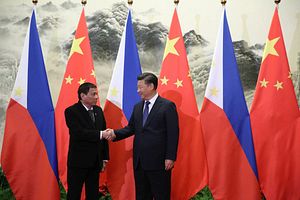Philippine President Rodrigo Duterte’s fifth visit to China last week was heavy with promise, but ended light with results. Visiting Beijing with a delegation including Foreign Secretary Teodoro Locsin and other high-ranking officials, Duterte vowed to discuss the South China Sea directly with Chinese President Xi Jinping for the first time.
Duterte, facing pressure at home amid the unfolding Vietnam-China spat near Vanguard Bank, resolved to bring up the 2016 arbitral tribunal ruling on the Philippines’ South China Sea case against China filed during his predecessor Benigno Aquino III with Xi. Speaking after the meet on Thursday, August 29, presidential spokesperson Salvador Panelo relayed the conversation. Duterte, according to Panelo, reiterated the 2016 arbitration ruling as “final, binding and not subject to appeal.”
Xi responded with China’s “position of not recognizing the arbitral ruling as well as not budging from its position.” Further clarification of China’s position is certainly not needed, but Duterte’s response is a sharp departure from the jubilation in Manila following the arbitration win. Still, Duterte noted his administration’s “deep concern” over recent incursions in the waters and the importance of maintaining open communication between vessels.
The pair “agreed that while their variant positions will have to remain, their differences, however, need not derail nor diminish the amity between the two countries. They shared the view that the contentious issue is not the sum total of the Philippines-Chinese bilateral relationship,” Panelo said. Instead, a focus on the joint exploration of offshore oil and gas and other investment opportunities will continue and the Philippines will remain a key partner of China until the 2022 presidential election.
Other aspects of Sino-Philippine relations also saw little resolution during Duterte’s trip. For instance, few sparks flew over the Philippines’ gambling laws, which had come under the scrutiny of Beijing in recent months. Beijing spent August leaning on Manila to outlaw online and offshore gambling — an industry that employs thousands of Chinese workers but attracts even more gambling fans from the mainland, where gaming is banned. An announcement in late August that the Philippines’ gaming agency, Philippine Amusement Gaming Corporation, would suspend the granting of new licenses was welcomed.
Chinese Foreign Ministry spokesperson Geng Shuang directly linked the new policy to “improving relations” between the two. “We hope the Philippines will go further and ban all online gambling,” he added, although trade publications report the issue was skirted during the visit.
The handling of these issues and more, and the visit more generally, reinforces a more general point: that the famously blustery Duterte loses his impetus when it comes to criticizing China. A critical op-ed from The Philippine Inquirer slams the result of the visit following the hyperbolic promises to address the UNCLOS ruling. “Duterte appeared to have raised the matter fleetingly, Xi swatted it away, and the issue went right back to where it was before — on the shelf, in the back-burner, once again to be ignored and left untackled,” the newspaper wrote. Opposition forces and social media users have been less eloquent in their criticism although the message remains the same — in the face of China, Duterte will buckle.
The President still enjoys phenomenally high satisfaction polling, reaching a new high in the second quarter of this year, but China remains an Achilles heel that he has managed to maneuver so far. Past the halfway point of his one and only term, a crowded field of Duterte allies is vying for his blessing and endorsement on the road to 2022. And even though his political opponents have criticized his China approach and there are some signs of popular opposition as well, it has not risen to the level that matches the alarming trajectory of Sino-Philippine relations.
However, that does not mean that the China issue is not one for Duterte to be cautious about – indeed, the concern continues to be real. For the weakened opposition, China-Philippines relations is one area in which it could strike. Take for instance, Leni Robredo, the vice president, who typifies the reality in the Philippines that because the vice president is elected separately from the president in the Philippines, both have at times held divergent views. Robredo, who has not been afraid to speak out on some of the president’s policies and is a potential Liberal Party nominee has already raised the issue. “The president has made a lot of statements which gives a sense we are acquiescing to what China wants,” she told Bloomberg ahead of the President’s trip to China.
Popular sentiment also reveals that concerns about China persist. Manila-based survey firm Social Weather Stations shows trust in China has fallen to a new low in recent months following the Recto Bank incident, with 51 percent of Filipinos saying they have “little trust” in China. President Xi’s reiteration that China will not accept the 2016 arbitral tribunal ruling is unlikely to spur much goodwill, but how that distrust will effect Duterte if at all, remains to be seen.

































